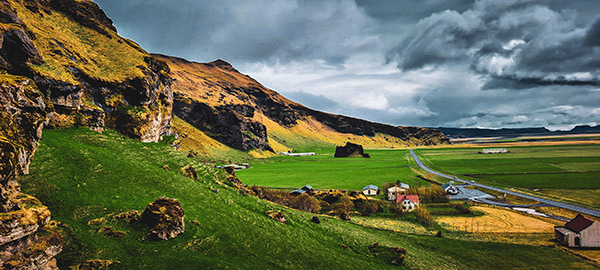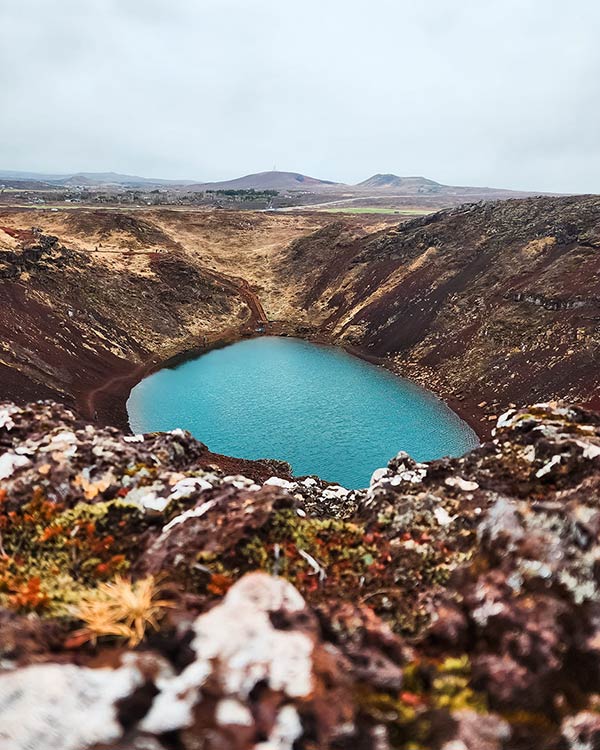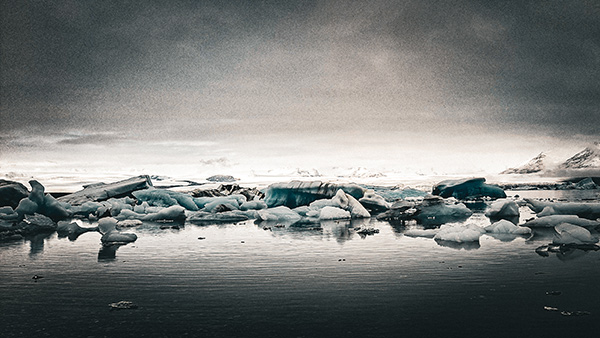Subtotal: $
Checkout
In Pursuit of Pure Northernness
Iceland’s vastness, perilousness, and barrenness haunt me. I wasn’t searching for God on that poetic island, but I found him.
By Daniel Whyte IV
May 29, 2024
“If you’re wearing a jacket, you might want to take it off. It will get hot in here.”
We’re sitting in a circle in a dark room with two dozen others. A magician has promised to show us a great wonder: liquid fire from a hundred miles or more beneath the earth’s surface. I’m still wondering if this is one of those attractions where the advertisements are better than the real thing.
I don’t take off my jacket.
“Land of Fire and Ice” sounds like a riff on a Game of Thrones novel title. But I think Iceland proves that God is irresponsible with his gifts, casually tossing so much gold before swine and insisting that we are not swine.
Iceland is overburdened by beauty. My sister and I spent six days on the island, and its vastness, its perilousness, and barrenness haunt me. Also haunting me: the number of times my phone said “signal lost” as we drove a rented hybrid with questionable gas mileage through mountain vistas and along the edge of the sea.
As we strolled the shores of lakes the color of mist-strewn skies, my thoughts rejoined on two themes: the longing for Northernness that C. S. Lewis wrote of so poignantly in Surprised by Joy and the feeling of being a foreigner in a foreign land. Not a “foreign land” in the sense of it being foreign to me (or me being a foreigner in it), but a land that possesses the quality of foreignness within itself. It made me think of Elwin Ransom and his interplanetary travels in the Field of Arbol, described in Lewis’ Space Trilogy.
Sparks
… without intervening soul, as sparks fly out of fire, He utters in each grain of [all worlds, and the bodies that are not worlds] the unmixed image of His energy.footnote
We saw no fire in Iceland, possibly because you don’t need to see the fire to know it is real. We felt it in the warmth of the waters of the Blue Lagoon, which can reach up to 100°F. We watched geysers huff and spit like the bitter grumblings of some subterranean dragon. And we heard it in tales from Vik, a city that sits in the shadow of Katla, a volcano long overdue for eruption. Vik will be wiped out in a few minutes if the fire flows too fast down the wrong side of the mountain.
In the places I usually inhabit, I forget what it means to live with fear and trembling. Nature’s dragons are tame and toothless. I google the local weather and go forth well-prepared.
But to live as they do in Vik, between Ragnarök (literally, the judgment of gods) – something that’s happened already and will happen again, not knowing when, is an awesome and awful thing. It gives gravitas to life. Not the sober acknowledgment of the inevitable grave, but a parousic mindset, a working knowledge that the world can change at any time – like that. In the twinkling of an eye, as fire rains down and sparks fly upward.

Road through southern Iceland. Photograph by the author.
Searching
He dwells (all of Him dwells) within the seed of the smallest flower and is not cramped.
The two great searches in life are the search for God and the search for self. These searches, I suspect, are never complete. If we find what we seek, we yearn beyond that and start searching again.
I wasn’t searching for God on that poetic island, but I found him, especially in the barren, snow-covered sweeps of Múlaþing. Earlier in the day, after a horse-riding excursion, one of the trainers asked if we were taking the “mountain road” to our next destination. I didn’t know what the mountain road was.
“Forthwith, we are taking The Way of the Sea,” I said. It didn’t sound as fantasy novel as all that but that’s the gist of it – GPS would guide us along a coastal highway. And it did, for the next hour or so, with the sea on our right and sweeping peaks on our left. But I really don’t like driving with an anxiety-inducing drop-off to my right so I was happy when the road turned westward and inland. Gray sky quickly gave way to white haze. Our altitude rapidly increased, the wind whipped up, and visibility dropped as snowflakes frisked the windshield. Then we hit a road with more gravel and potholes than pavement. Signal lost, my phone said.
Ah, the mountain road! I didn’t want to take it. The tires on the rental didn’t look like they were made for rough roading, and I was pretty sure there would be no place to stop for food or gas or help along the way. My sister encouraged me as we watched some cars creep down the road toward us. We decided it couldn’t be that bad.
It was, in fact, awful. Five minutes on, and we couldn’t tell sky from earth. Only a vast whiteness, an unutterable Northernness, interrupted by a switchback of churned snow and ice that marked the road others had driven.
When we could make out snow-covered mountains to the west, we stopped and got out to take pictures. The wind pierced us. I realized the rental, which was a light gray, could be swallowed up by the scenery. We’d stumble away from it and be unable to find our way back.
That was when I began to feel it. An emptiness. A keening heart-cry. A facing up to the reality that I am always at the mercy of something other than myself. It’s a brutal reminder for me, someone who takes pride in planning well: I’m just a spider dangling by a thread from the finger of God. Something could go wrong – a flat tire, a wrong turn, getting lost, a car crash. (We actually went sliding once.) And without phone signal, we’d find no help nor pity in all that blistering blindness.
It was such a good feeling.
Suffocation
… a peopled world [is] no more needful than a world that is empty: but all needless alike, and what all add to Him is nothing. We also have no need of anything that is made. I am infinitely superfluous, and your love shall be like His, born neither of your need nor of my deserving, but a plain bounty.
The world is infinitely superfluous. And Iceland’s superfluity comes primarily in the form of waterfalls. We explored five in one day and could have stopped at more. But I got tired of getting my feet wet.
It’s possible to choke on beauty, to be overwhelmed and suffocated by it. To realize we can’t receive all of it as it’s presented to us. It’s like trying to catch a waterfall in your hands.

Kerið Crater. Photograph by Danita Evangeline White.
That feeling – that we’re not only missing something but that it’s impossible for us to get it – hurts. This is why C. S. Lewis’s pursuit of joy, embodied in his longing for Northernness, is shot through with grief. When you want something, even something you’ve never had, you realize how much you miss it.
As we chased beauty across Iceland, I finally experienced the mythic quality of Northernness that informed Lewis’s vision: the austere land dashed upon by shattering silver waves, its unwasted sky glimmering with pathos-laden constellations and, at other times of the year, lights dancing like angels heard on high. The landscape mirrored my internal longing. The North’s aesthetic, its absentness, its emptiness captured me. Its foreignness is piercing and superfluous, so infused with sehnsucht as to be suffocating.
Lewis said his craze for Northernness “was essentially a desire and implied the absence of its object.”footnote But we can survive neither the absence of the object nor the object itself. Hence, we suffocate in superfluity.
Silence
Be comforted, small immortals. You are not the voice that all things utter, nor is there eternal silence in the places where you cannot come.
I love big cities. I love the way they bustle and hustle and careen. Cities speak a language that I understand, and they are always calling my name. London, Dublin, Madrid, Tokyo. But standing at the edge of a sapphire lake within the Svartsengi lava fields, my feet sinking in rich bog moss, I realize that the world largely unshaped by man’s hands is not calling my name. It isn’t speaking my language at all.
I realize this again and again. At the bottom of Skógafoss, the foot of a rainbow descends into the whirlpool. On the Fimmvorduhals Trailhead, I glimpse the sea and snow-capped mountains in a single Tolkien-esque vision. By the stinking, boiling mud pits of Námafjall Hverir, the sulfur rises out of the earth’s gut forever and ever.
I am, for once, not the voice that all things utter. I am shut out of the conversation and forced into silence. Into wonder.

Diamond Beach, Iceland. Photograph by the author.
Someone, nay, several ones are speaking. But not just speaking, performing. I hear it as if listening from behind a wall with a thick door. The conversation is wild, a vigorous monologue interrupted by irreverent one-liners. Dubstep interjects classical symphony. Whoever wrote the script used words too big for me, revised it a million times, and then decided to produce every single iteration. And he is not done producing or iterating.
I will give up on trying to understand. I will be content to wonder.
I am a small immortal, and I am comforted.
I am silent now. But when I speak again, I will share in the music of the spheres. I will say – with the waterfalls, lagoons, volcanoes, glaciers, and the stinking mud pits – Blessed be He! Blessed be He! Blessed be He!
The room gets darker and darker still. An orange glow emerges from a hole in the wall, and simultaneously the temperature flashes upward. A wave of sudden warmth makes me sit up straight. Liquid fire snakes into the room on a bed of glossy black sand laced with basalt. My eyes water. (I’m wearing safety glasses – “just in case,” the magician has said.) I suck in the suddenly parched air and swallow hard.
It’s too much. I yank off my jacket.
Footnotes
- All quotes from Chapter 17 of Perelandra, by C. S. Lewis.
- C. S. Lewis, Surprised by Joy, Chapter V
Already a subscriber? Sign in
Try 3 months of unlimited access. Start your FREE TRIAL today. Cancel anytime.







Arlene Peregrin
Hello Daniel. What a beautifully written piece. It made me cry. Such a personal response to beauty!
Sean Whiting
What a richly written and wondrously communicated experience in a truly foreign land. I highly recommend the author watch the 2023 movie, Godland, available on streaming. Thank you for this experience of wonder in Iceland!